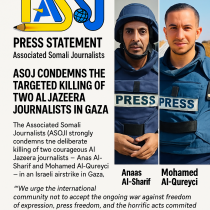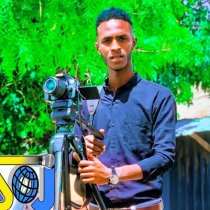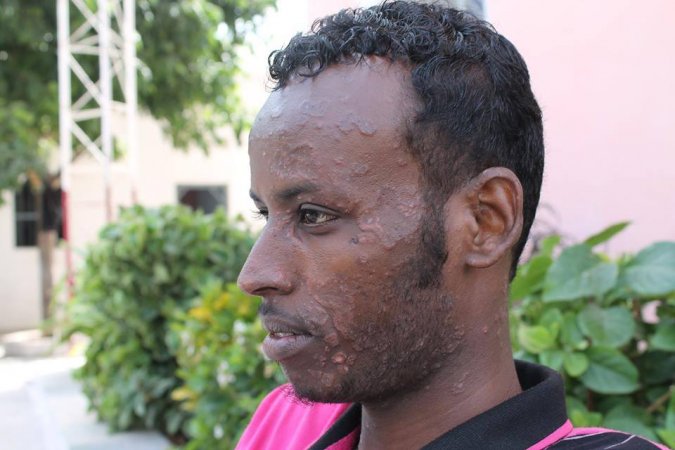
Somalia:Journalists on the run,By Amos Kareithi.
Nairobi 19 Augosto 2009


They have run out of ink, blood, breath and tears. Now they have no more
options. They are on the run. And there is no hiding place.
Their
government does not want them. The militiamen are having a field day gunning and
bombing them out of existence.
Behind the flapping curtain, a terrified man
hides from the prying eyes of his neighbours passing centimetres away.
Our
knock elicits a terrified response punctuated by chest- wracking coughs.


The squeaky voice is adamant. The warning, heartbreaking!
"Please do not come in. I do not want to speak to strangers. The more you
stand there the more you endanger my life," 40-year-old Abdi Hakin Omar Jim'ale
pleads.
In another time in another place, Hakin had a career, a wife and
family. All that is history now. He may never write again as his right hand is
rotting away.
His colleague, Mohamed Shidane Daban, once earned a living
using his right hand as a journalist. He too has one arm and is yet to master
how to use the left hand. Daban explains that Jumali is about to have his right
arm amputated to save his life.
Witnesses of terror
But this is not the
most urgent need. "We are trying to raise money to feed him. His house rent is
in arrears and we do not know where to get Sh7,000," Daban explains.
The
rent, for the single room in a crowded compound is high. But Jumali and his
27-year-old roommate, Hassan Ali Gessey formerly SomaliWeyn Radio and TV News
Editor, are like beggars.
They are thousands of kilometres away from home but
have no dreams of ever returning.
Instead of feeling homesick, they see
silhouetted armed ghosts determined to kill them in the strife torn
Somalia.
Theirs is the plight of journalists who are like ‘cursed’ messengers
and unwanted witnesses of the anarchy which has engulfed their lawless
country.
Despite escaping from the crudest to the most sophisticated
missiles, journalists from Somalia have no hiding place. About 20 of them have
escaped Mogadishu, the most dangerous city in the world for journalists, into
Kenya.
CCI traced them in their hideouts in Eastleigh, Nairobi, and have
hair-raising accounts.
Most journalists in Somalia are quitting in their 20s
and those who persist pay the ultimate price, death. Most have been scared to
silence.
Daban’s account is the most gripping. He has been kidnapped once,
exiled twice and bombed four times.
On three occasions, he has slipped
through the fingers of the unforgiving and dreaded Al-Shabaab (the youth)
militiamen.
Daban, a veteran Radio Bandir broadcaster invoked the wrath of
Transitional Federal Government agents who incarcerated him for 115 days.
"March 8, 2003 will forever be engraved in my mind. Four armed men raided my
house in Karan, Mogadishu, hours after I hosted a radio show," Daban says.
In
his show, callers condemned the rape of a 12-year-old orphaned girl by four
militiamen.
Hands ripped off
"As I fed biscuits to my 18-month-old
daughter, four gunmen stormed the compound," he recalls. Daban wipes a tear with
his left hand as he recounts how the gang sprayed him and his daughter with
bullets.
His wife Fatuma adds: "When the guns fell silent, I came out of the
house. I found the badly mutilated body of my daughter sprawled on top of my
husband. I fainted."
When Fatuma regained consciousness at Keysany Hospital,
she discovered that her daughter Sarah had died and her husband
crippled.
"The gunmen literally ripped off my right hand. I left it at the
scene. My kidney had to be removed as it was damaged," a tearful Daban says.
After recovering, Daban was supposed to relax and draw a monthly salary but he
found the microphone irresistible.
One year later, in 2004, he crossed the
path of Hassan Dahir Aweys, now the leader of Al-Shabaab, during a press
conference at Peace Hotel for asking ‘nonsensical questions.’
"He called me
the following day and declared he would never forgive me. He had not expected me
to record the press conference," he adds.
After this he slipped out of
Somalia to South Africa where he stayed until 2007 when he returned to his
‘dangerous job.’
Despite escaping death many times, Daban counts himself
lucky.
His workmates such as Abdullahi Naste, Dahir Farah and Abdukadir
Kaskey were killed by militiamen and government forces.
Politicians and
militiamen use press conferences to trap journalists knowing all too well that a
news hungry scribe can never say no to a good story.
Asking many
questions
Once smoked out of the open, the journalists are then gunned down.
On March 21, last year, Hamud Mohamed Hasan and Bashir Dirie Nalei of
Universal TV were arrested for ‘asking too many questions’ during a press
conference by President Abdulahi Yusuf Ahmed.
Journalists’ death toll,
according to Reporters San Frontiers, (Reporters Without borders) is very high
in Somalia.
Those killed so far are Ali Mohamed Omar (Radio Warsan) Mohamed
Abdulahi Khalif (Radio Voice of Peace), Abshir Ali Gabre and Ahmed Hasan Mahama
of Radio Jowhar.
Others are Mahmad Ahmed Ali (Capital Voice) Ali Iman
Shamarke (HonAfrik) and Bashir Nur Gedi (Radio Shabelle).
The chairperson of
Somali Media Women Association, (Somwa) Marian Zeila Abdirisuk, cringes in
horror when her country is mentioned. The 22-year-old journalist was never given
a chance to consummate her marriage.
"I married Mohamed Adawe, a journalist,
on December 24 last year. A week later I had to run for my life," Marian adds.
Her wake up call came when Al Shabab demanded to know why she was breaching
their code by working, yet she was a woman.
"They also said it was against
their religion for women to mix with men in work places," she adds.
Flogged
in parliament
But the young professional who has dedicated her life to
championing the cause of women journalists, vows never to surrender.
Somalia,
she says is not a place for a female journalist given the dictates of the
religious fanatics who want to treat women as objects.
She recalls how a
female journalist was flogged in Parliament by the speaker’s guards while MPs
watched in glee.
"The same writer was attacked later at Mogadishu Airport
while waiting to cover the arrival of the then Prime Minister, Ali Mohamed Gedi
who was flying from Nairobi," Marian explains.
In Nairobi, the journalists
CCI traced say they are living in fear of being attacked by the very forces they
fled from.
"I came to Kenya through Dadaab refugee camp. I saw many Al-Shabab
militiamen there. They later tried to kill me," Daban says.
Heavily armed
militiamen invaded his house in block J at midnight on January 9. Luckily, he
had been tipped off but the militiamen harassed and injured his wife Fatuma. "I
do not feel safe. My family is living in perpetual fear of another attack. I was
lucky to cheat a roadside car bomb but I do not want to overstretch my luck,"
says Daban.
"I have seen their faces. They are here. It is like there is no
hiding place. Even when I was taken to Kakuma by UNHCR, danger was still
lurking," he adds.
Somalia’s Wayn Radio and TV News Editor, Hassan Ali Gessey
says he was forced to resign two months ago after receiving seven death threats
from government and militia forces.
A frightened Gessey explains: "On the day
I resigned, 14 other journalists too were forced to stop writing by militiamen.
I can not mention the group as it has a presence in Nairobi."
According to
United Nations High Commission for Refugees (UNHCR) Spokesman, Emmanuel Nyabera,
the Kenya Somalia border is a dangerous zone.
"The areas around the camps
have always been insecure. A few incidents have been experienced but the police
usually intervene," Nyabera says.
"We have no evidence that Somali militia
have sneaked into the camps to pursue people. We work very closely with the
Government and refugee representatives to maintain the civilian nature of the
camps," he states.
Life of squalor
"Why are they killing us? Why are they
targeting journalists? What have we done? Even here in Kenya I know I will be
attacked. I have seen them here," says Daban.
CCI has learnt that there are
17 Somalia journalists in Kenya still nursing wounds. An additional 20 have fled
to Tanzania after being hounded out of Kenya by their tormentors while Kampala
is hosting 15.
Those exiled in Kenya are living in squalor, packed in tiny
windowless rooms. Daban is sharing his 10 by 10 feet room with 16 people among
them his mother-in-law and several sisters-in-law.
"When darkness fall, I
stash my three children in a closet. The adults sleep on the floor. It’s a
miracle nobody has suffocated," he explains. During the day, he has to contend
with a swarm of flies from a mountain of garbage nearby. At the end of the
month, he has to part with Sh7,000.
The journalists contend that although
Somalia has never known peace for two decades, the country has never witnessed
the current barbarism and bloodletting.
Before all the witnesses of human
suffering in Somalia are whittled away by the trigger-happy militia men, the
exiled journalists hope that one day they will outrun their
persecutors.
Source: The Standard

 0
0 


























Somalia:Journalists on the run,By Amos Kareithi.
Nairobi 19 Augosto 2009